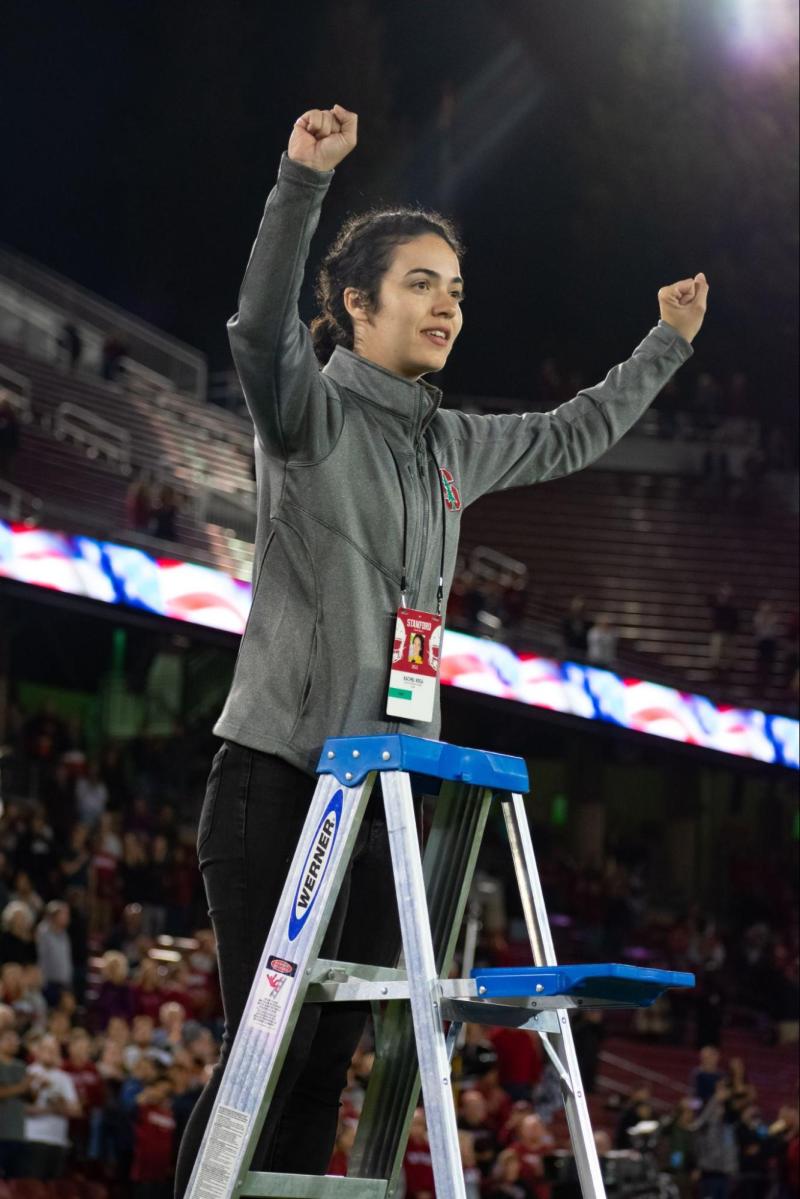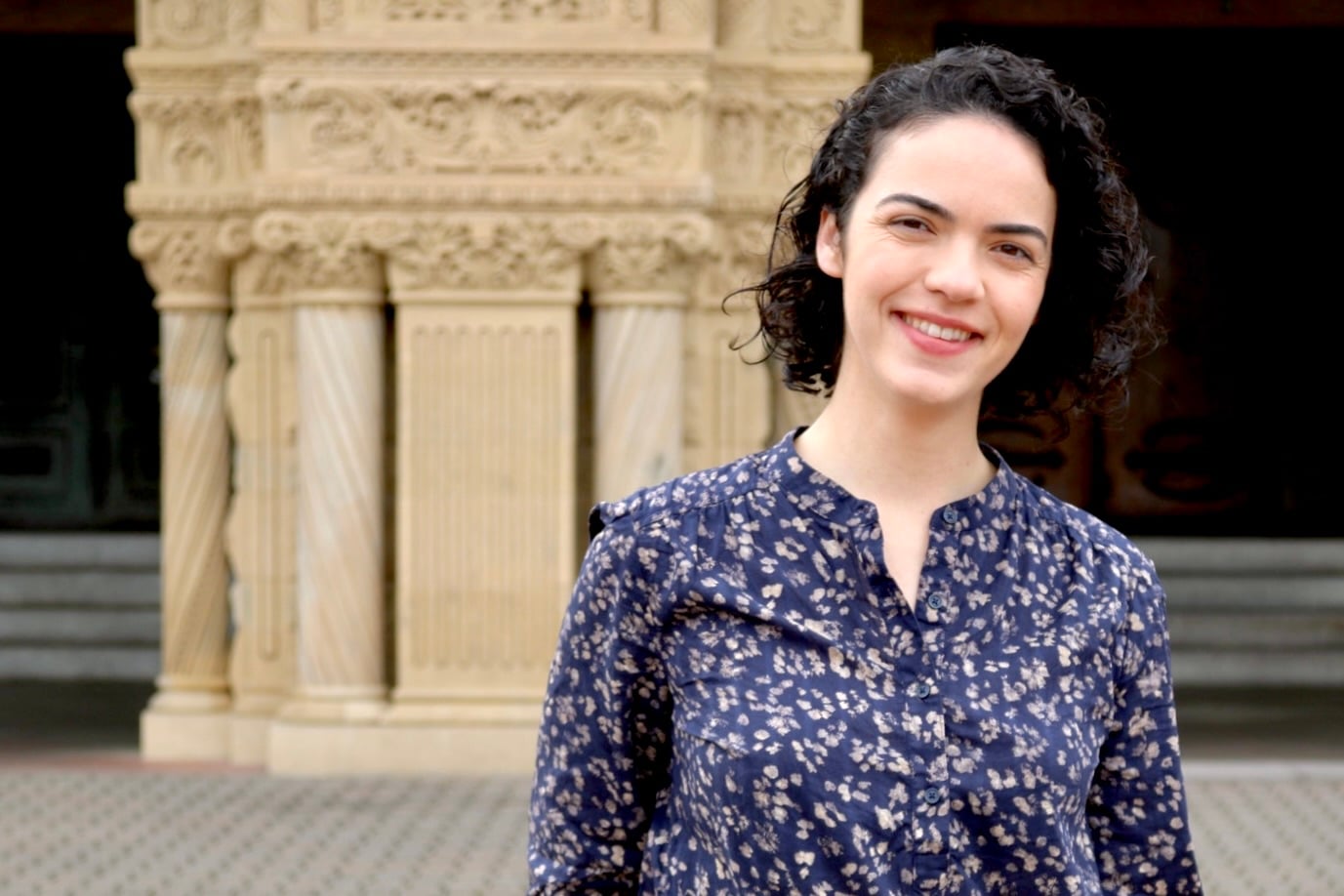An intricate melody permeates the energetic drumline and saxophone accompaniment of the Leland Stanford Junior University Marching Band (LSJUMB) at the group’s spring quarter rally. Amid the mass of students, one clarinetist can be heard through the revelry. She’s none other than Associate Director of Bands Rachael Vega, the first woman of color to occupy a band directing position at Stanford University.
Vega’s work as Associate Director of Bands includes supporting LSJUMB student leaders, serving as event liaison and juggling a number of logistical matters. As hers is a newer position for the University, Vega said she wants to develop it to best support students.

Vega always knew she wanted to be involved in music later on in life. However, she wasn’t always set on band directing.
“At one point in school, I had a chance to do a student conducting of the band and I thought, ‘this is actually really fun,’ so I kind of explored that more and went into music school for instrumental music education,” Vega said.

Vega auditioned into Florida State University on her primary instrument, the clarinet, and went on to graduate with a Bachelor’s in instrumental music education and a Master’s in music education. She then became the Director of Bands at Wakulla Middle School in Crawfordville, Florida, and went on to direct bands at Alto International School in Menlo Park, CA before coming to Stanford to work alongside the Director of Bands Russell Gavin.
Gavin had learned of Vega’s work band-directing in the Bay Area before her appointment to Associate Director of Bands at Stanford and had high expectations of what she would bring to the table. Vega did not disappoint.
For one, Gavin says Vega continues to bring ingenuity to the job in surprising ways. In the last academic year, when the pandemic was still impacting in-person attendance at Stanford, Vega started teaching ukulele classes. Sharing this part of herself was a way in which she was “being a service to the students,” he said.
LSJUMB sets itself apart from other university-level marching bands by welcoming all, regardless of musical experience. Vega is thus also tasked with working extensively with members who are learning new instruments.
Band manager Ellie Vela ’23 greatly values the work that Vega puts toward mentoring students who are newer to their instruments.
“I think [Vega] definitely adds a huge support mechanism for recruiting people into Band who may be new to their instruments or didn’t have a ton of musical experience,” Vela said. “Having somebody whose specific expertise is music education — specifically from a beginner focus — really puts our money where our mouth is and says, ‘We welcome people and we have the support network for you once you get here.’”
The fact that Vega is the first woman of color to hold an LSJUMB band director position also matters to Vela: “It means a lot to me as a person of color in Band, that we have a person in a professional role, who also shares that identity with me and we can connect,” they said. “Rachael and I have connected on that front before.”
Outside of supporting the Bands, Vega is also an appointed lecturer at the Graduate School of Education (GSE) and works with the Bridge Peer Counseling Center, a student-run peer-counseling center on campus. There, Vega helps coordinate EDUC 193P: Peer Counseling at the Bridge, the second course in a training series with EDUC 193A: Listen Up! Core Peer Counseling Skills, that Stanford students must take before working at the Bridge.
Bridge staffer Kate Frimet ’22 M.A. ’22 contacted Vega in early 2022 to help out with the course. Vega now works alongside Executive Director of Threat Assessment Alejandro Martinez in supporting students in EDUC 193P. She picked up the teaching material quite rapidly, according to Martinez, and has since been an effective teacher in addition to a consistent source of support.
“She knows how to engage with students very well [and is] very generous with her time so I have a lot of admiration and respect because teaching these classes requires that you stretch yourself,” Martinez said. “She makes the class comfortable for people — and some of the material is hard, like body image, depression, anxiety.”
Before Vega began working in her role, Gavin could only hope she would live up to what he’d seen on her resume — “that she’s an elite educator who is not afraid of thinking outside of the box. You hope they’re going to be a great person, and a great collaborator and a great colleague,” he said. “In the case of Rachael, she’s been all of those things.”
